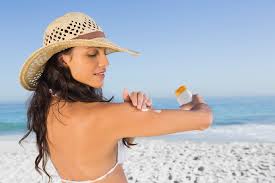The days are becoming longer and hotter which means that there is more time to be outside doing a number of different activities. Staying out in the sun might give you a nice glowing tan, but it is definitely not worth the long term skin damage that it can cause. While it may be beneficial for the mind to soak up some sun after a long dark winter if you are going to be out in the sun, you need to stay safe.
Some people get a sun tan easily while others get sunburnt. People who are blonde or red hair, have light- coloured skin and light coloured eyes tend to get sunburnt easier than those with dark eyes and skin. The reason for this is because they have less melanin which is a chemical in the skin that protects it from sun damage by reflecting and absorbing UV rays.
Sun exposure can cause a skin cancer at any age thus we suggest you be careful in the sun if you burn easily and spend hours outdoors. Research shows that more than 90% of skin cancer cases are caused by sun exposure. The Dermatological Society is urging the public to take all the preventive measure necessary in the summer, and to see a dermatologist if any blemishes or lesions are spotted.
The American Cancer society estimates that there are more than are more than one million new cases of skin cancer every year. It is very important to examine your body monthly because skin cancer detected early can almost always be cured. The most important warning sign is a spot on the skin that is changing in size, shape or colour during a period of 1 month to 1 or 2 years. Skin cancers can take often take different forms including the following:
- Sores that don’t heal
- Red, scaly, sharply outlines patches
- Pale, wax- like, pearly nodules
- Small, mole- like growths- melanoma
Some people think about protecting themselves from the sun only when they spend the day at the beach or pool. But sun exposure adds up day after day and it happens every time you are in the sun. The following are tips of how you can protect yourself from the sun:
- Stay in the shade: An obvious way to avoid or limit your exposure to UV light is to avoid being outdoors in direct sunlight for too long. This is particularly important between 10am and 4pm, when the UV light is the strongest. If you have to be in direct sun light for a long time, use clothing to block the sunlight. Be aware that covering up does not block out all UV RAYS. If you can see through the fabric, the UV rays can get through as well.
- Use sunscreen: Sunscreen protects from the sun but it is important to know that it is just a filter. It does not block all UV rays. It should not be used as a way to prolong your time in the sun. Use sun screen with a Sun Protection Factor of at least 15. Make sure that it is water resistant and that you reapply it every two hours.
- Wear a hat and sunglasses: The wider the hat the better as it covers more areas including the face and shoulders. The type of sunglasses that will give you the best protection to your eyes are UV protective glasses. These will protect the UVB rays from harming your eyes because these rays cannot pass through glass.
- Protect children from sun: Children need to be protected from the sun much more than an adult. They tend to spend more time outdoors, can burn easily and are not aware of the dangers of being exposed to the sun. It is very important to cover your children especially in sunnier parts of the world.

